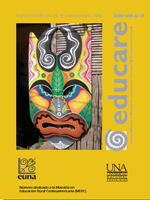Diagnóstico situacional de la labor docente y de la oferta de formación de educadores rurales en Costa Rica
DOI:
https://doi.org/10.15359/ree.12-Ext.8Keywords:
teaching performance, rural school, rural community, teacher trainingAbstract
The article explores the performance of rural teachers in Costa Rica and analyses the curricula taught in public universities. It also examines limitations and advantages of teaching in rural areas and the way teachers face the challenges imposed by this kind of context in terms of cultural, economical and social particularities. Finally, based on the information collected in this investigation, a series of contents are presented in order to enrich the curricula of teacher training universities and to offer to their students, future teachers, the necessary tools to work in the rural area.
References
Aguilar, M., Monge, M. (2000). Hacia una pedagogía rural. Costa Rica: Universidad Nacional.
Centro de Investigación y Docencia en Educación [CIDE]. (1986). Plan de estudios para el
Proyecto experimental de formación de educadores con concentración en la problemática
del área rural. Heredia, Costa Rica: Universidad Nacional. Carvajal, V. y Torres, N. (2006).
La formación de docentes rurales en Costa Rica. Proyecto PADES [CD]. Heredia. Costa
Rica: Universidad Nacional.
Comisión de Autoevaluación para la acreditación. (2005). Informe de autoevaluación con fines
de acreditación de la carrera de Bachillerato y Licenciatura en Educación Primaria.
Documento sin publicar. San José, Universidad de Costa Rica.
Consejo Nacional de Educación Superior [CONESUP]. (2005). Oferta académica CONESUP
según sesión 544-05. San José, Costa Rica.
División de Educación Rural [DER]. (2006). Plan de estudios para la carrera de Licenciatura en
Educación con énfasis en Educación Rural, I y II ciclos (Formato digital). Heredia, Costa
Rica: Comisión de rediseño curricular Universidad Nacional.
Molina, I. (2007). Educación y sociedad en Costa Rica: de 1821 al presente. [Versión preliminar en
digital]. Universidad de Costa Rica, Costa Rica: Escuela de Historia. Centro de investigación
en identidad y cultura latinoamericanas.
Quesada, J. (1992). Educación en Costa Rica: 1821-1940. San José, Costa Rica: EUNED.
Rojas, E. (1976). La formación y la capacitación del personal docente y administrativo. Trabajo
final de licenciatura no publicada, Universidad Nacional, Heredia, Costa Rica.
Salazar, J. (2003). Historia de la educación costarricense. San José, Costa Rica: EUNED.
Sequeira, A. (1993). La formación de educadores en educación primaria ante la demanda del
Ministerio de Educación Pública. Tesis de maestría no publicada, Universidad de Costa Rica,
San José, Costa Rica.
Solano, J., Van Kampen, P. y Ovares, S. (2003). El docente rural en Costa Rica: Radiografía de una
profesión. Heredia, Costa Rica: EUNA.
Universidad Estatal a Distancia [UNED]. (2007). Plan de estudios de Educación Primaria.
Consultado el 11 de julio de 2007 de http://www.uned.ac.cr/Educacion/01plan.html
Downloads
Published
How to Cite
Issue
Section
License
1. In case the submitted paper is accepted for publication, the author(s) FREELY, COSTLESS, EXCLUSIVELY AND FOR AN INDEFINITE TERM transfer copyrights and patrimonial rights to Universidad Nacional (UNA, Costa Rica). For more details check the Originality Statement and Copyright Transfer Agreement
2. REUTILIZATION RIGHTS: UNA authorizes authors to use, for any purpose (among them selfarchiving or autoarchiving) and to publish in the Internet in any electronic site, the paper´'s final version, both approved and published (post print), as long as it is done with a non commercial purpose, does not generate derivates without previous consentment and recognizes both publisher's name and authorship.
3. The submission and possible publication of the paper in the Educare Electronic Journal is ruled by the Journal’s editorial policies, the institutional rules of Universidad Nacional and the laws of the Republic of Costa Rica. Additionally, any possible difference of opinion or future dispute shall be settled in accordance with the mechanisms of Alternative Dispute Resolution and the Costa Rican Jurisdiction.
4. In all cases, it is understood that the opinions issued are those of the authors and do not necessarily reflect the position and opinion of Educare, CIDE or Universidad Nacional, Costa Rica. It is also understood that, in the exercise of academic freedom, the authors have carried out a rogorous scientific-academic process of research, reflection and argumentation thar lays within the thematic scope of interest of the Journal.
5. The papers published by Educare Electronic Journal use a Creative Commons License:














 The articles published by Educare Electronic Journal can be shared with a Creative Commons License:
The articles published by Educare Electronic Journal can be shared with a Creative Commons License: 



